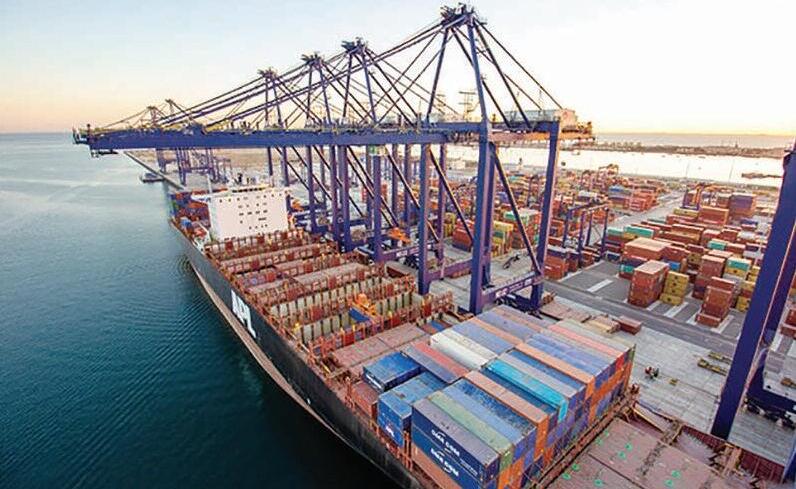

PAKISTAN, AFGHANISTAN AGREE NOT TO ALLOW USE OF EACH OTHER’S SOIL FOR TERROR
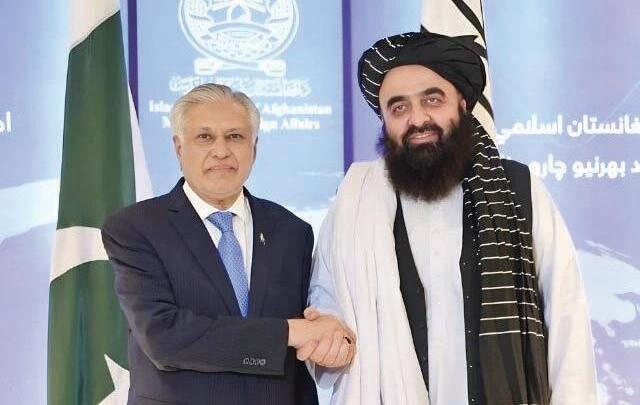
DE P U T Y Prime Minister and Foreign Minister Ishaq Dar on Saturday said both Pakistan and Afghanistan have agreed not to allow nefarious elements to use their soil for attacks or illicit activities saying both sides would be responsible to take appropriate action in such a case Addressing a press conference after talks with many Afghan officials during his daylong visit to Kabul, DPM Dar said that the two sides agreed to continue dialogue for resolving bilateral issues in a positive environment
We have requested Afghan Interim government that we have to work together for the progress, betterment and peace and security of the region For that, neither will we allow anyone to use our soil to conduct illicit activities in Afghanistan and graciously nor will you
The DPM said: We both countries will strictly deal with and no one will be permitted to there is no permission either way use our land to use against the other for any security risk or terrorism If someone does then we both will be responsible to take action against such elements in our countries and stop them
FM Dar thanked the Afghan side for hosting the Pakistan side in a splendid manner and said he had invited Afghan officials to visit Pakistan “As I consider here Afghanistan my second home, Pakistan is also their second home ”
In his statement Saif said that the KP government had repeatedly urged the federal government to start negotiations with Afghanistan in order to take effective steps toward ending terrorism and bringing peace to the region He emphasised that KP was on the front line in the fight against terrorism and that it was the most affected province Therefore ignoring the province in this sensitive process reflects a lack of seriousness The KP government had sent
He said the Afghan officials had promised him to visit Pakistan emphasizing that problems between the neighbouring countries could be smoothly sorted out and prevented only when relations were maintained diplomatic activities carried on and committees kept working regularly Dar said the transit track and trace system would be functional by June 30 and said it could benefit both sides by increasing the pace of flow for Afghanistan’s transit goods He added
The United Nations Under-Secretary-General for Peace Operations Jean-Pierre Lacroix called on Interior Minister Mohsin Naqvi in Islamabad on Saturday and discussed a raft of issues with him On arrival at the Interior Ministry, United Nations Under-Secretary General was warmly received by Mohsin Naqvi During
Terms of Reference (TORs) to the federal government three months ago for initiating dialogue with Afghanistan These TORs stressed including tribal elders and all stakeholders in the process he added According to him the TORs could help make the negotiation process meaningful and successful He clarified that without taking all stakeholders into confidence the dialogue process could not be fruitful If the government genuinely wants lasting peace in the region it must seriously include the Khyber Pakhtunkhwa government and other affected parties in the consultation process I hope that the federal government will now adopt a more serious approach and work with all relevant parties to develop a comprehensive strategy so that lasting and sustainable peace could be achieved through negotiations with Afghanistan,” he concluded
that an agreement was reached on insurance related matters as well for trade
The foreign minister said Pakistan had requested that trade delegations and exhibitions between the two countries also be facilitated since such activity was highly necessary to ramp up trade prosperity and business between the neighbours
Prime Minister Muhammad Shehbaz Sharif has said that Pakistan offers a highly conducive environment for both domestic and foreign investment with vast potential for economic growth and employment generation through the use of modern technology Speaking at the Health Engineering and Minerals Show at the Expo Center on Saturday, the Prime Minister highlighted the government’s commitment to creating investment opportunities across various sectors including mining, information technology, and artificial intelligence Pakistan is rich in talent, especially in IT and AI sectors We are extending investment opportunities to friendly nations and inviting them to initiate joint ventures particularly in the mining and minerals sector, he said The event was attended by Federal Minister for Commerce Jam Kamal Federal Minister for Petroleum Ali Pervaiz Malik Chief Executive of TDAP Faiz Ahmed FPCCI President Atif Ikram Sheikh, business leaders, foreign delegates, and economic experts PM Shehbaz emphasized that
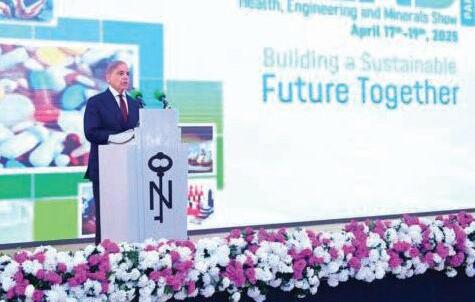
over 60% of Pakistan’s population comprises youths who are intelligent capable and equipping themselves with modern skills and professional training Our young generation is our asset, and with the right direction and innovation they can drive Pakistan’s economic success he added The Prime Minister pointed out the government s achievements in stabilizing the economy “Inflation has dropped from 38%
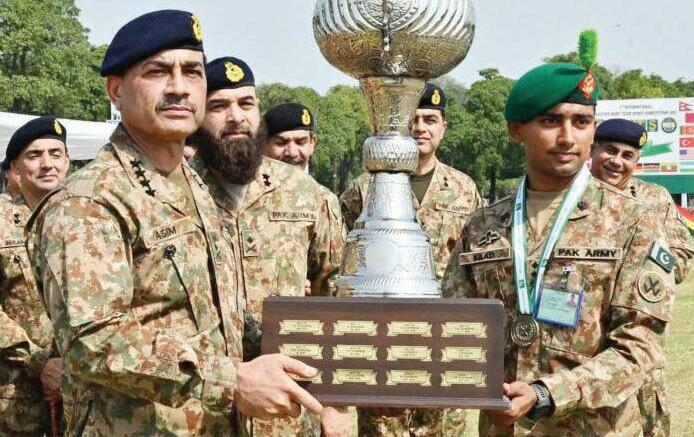

GO Pakistan urges PM to review Ogra chairperson amid concerns over oil sector stability
Gas and Oil Pakistan Limited (GO)
on the acting Afghan Prime Minister Mullah Muhammad Hassan Akhund, the FO added in a separate statement Both sides exchanged views on key issues of mutual interest, including security, trade and transit cooperation, and explored ways to enhance people-to-people contacts Reaffirming the commitment to continued engagement both sides agreed to maintain high-level exchanges to further strengthen the relations between the two brotherly countries Dar also met acting Afghan Deputy PM Mullah Abdul Salam Hanafi for talks in which the two leaders discussed all issues of mutual interest, including peace and security, and people-to-people contacts They also agreed to enhance bilateral trade transit and economic cooperation to the mutual benefit of the people of both countries They further decided to remain engaged to achieve the full potential of regional economic development, including through realisation of trans-regional connectivity projects
emphasized that print media holds significant value in responsible journalism, but the fallout from government complaints about social media has also put mainstream media at risk
He pointed out that punitive actions against media organizations and journalists are mounting regretting that despite claims of national progress, the print media is further deteriorating due to the government s inattention
Arif pointed out that the print media now heavily relies on government advertisements due to the shrinking budgets of private industrial and economic
sectors He noted that this reliance has exposed the industry to increasing pressure suggesting the newspapers should leverage digital technology and adopt modern solutions to survive the ongoing challenges
CPNE Senior Vice President Anwar Sajidi acknowledged that print media is facing an unprecedented crisis with social media overwhelming traditional journalism
He noted that print media in Balochistan is enduring one of the toughest periods in history
Secretary General Ijazul Haq stressed the importance of identifying the root causes of these issues and highlighted that government ads which are essential for the survival of print media are often withheld as a tool for exerting pressure He also mentioned the federal government s
recent decision to directly deposit payment for government advertisements into newspaper accounts a step that the Punjab government is following Dr Jabar Khattak proposed solutions such as solution journalism, the establishment of a joint printing press, and the use of AI technology to improve print media
Kazim Khan called for the abolition of anti-media laws including the PECA Act and stressed the need for legal protections for journalists and media institutions
The meeting also discussed the challenging situation of press freedom in Punjab, with Ayaz Khan expressing concern that the state’s control over mainstream media is only empowering social media Khyber Pakhtunkhwa s Vice President Tahir Farooq shared an update on CPNE s ongoing case regarding pending payments to newspapers in Peshawar, with the expectation of settlements by June
The meeting also addressed concerns over notices sent by the Federal Board of Revenue (FBR) to newspapers and condemned the suspension of ads to the Dawn newspaper CPNE also released the draft of its annual Pakistan Media Freedom Report which highlights journalists who were killed, injured, or forced to leave the country between 2024 and 2025 The report underscores growing concerns over the state of media freedom in Pakistan
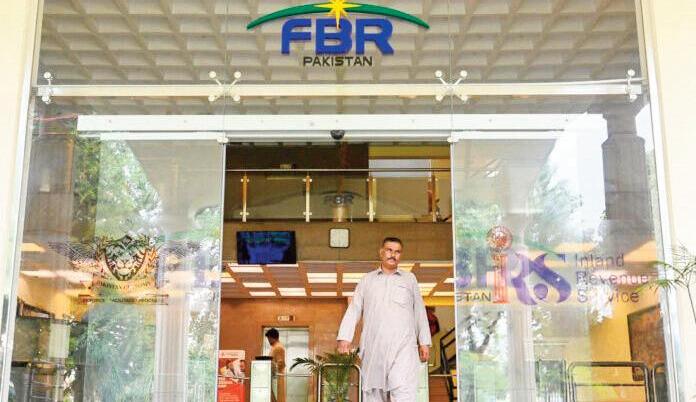
rendering them outdated Yet, no corrective steps were taken
The report also highlights that recruitment efforts spanning over a decade were marred by red tape unapproved interview minutes and mysteriously missing documentation Applications were received, interviews were held, yet nobody was hired Meanwhile officials from DPP and MoNFS&R failed to adapt
commodities compromised Even when the department shifted toward outsourcing, a lack of strategic vision prevented the integration of existing government infrastructure and the fumigation chambers along with other CPQL equipment stayed put – unused- in multiple cities across the country The committee, while not being able to unearth any financial embezzlement, has pinned the failure on years of professional negligence and a lack of institutional accountability A list of high-ranking officials including several former federal secretaries, additional secretaries, director generals, and directors, has been identified for their roles in the project’s stagnation Those named include Muhammad Ismail Qureshi (2004–2007) Zia ur Rehman (2007–2010), Seerat Asghar Jaura (2013–2016), Abid Javid (2016–2017), Hashim Popalzai (2018–2020), Ghufran Memon (2020–2022), and Zafar Hassan (2022–2023) among others These officers were responsible for policy direction budget approvals and oversight and are now facing the possibility of show-cause notices issued via the Establishment Division
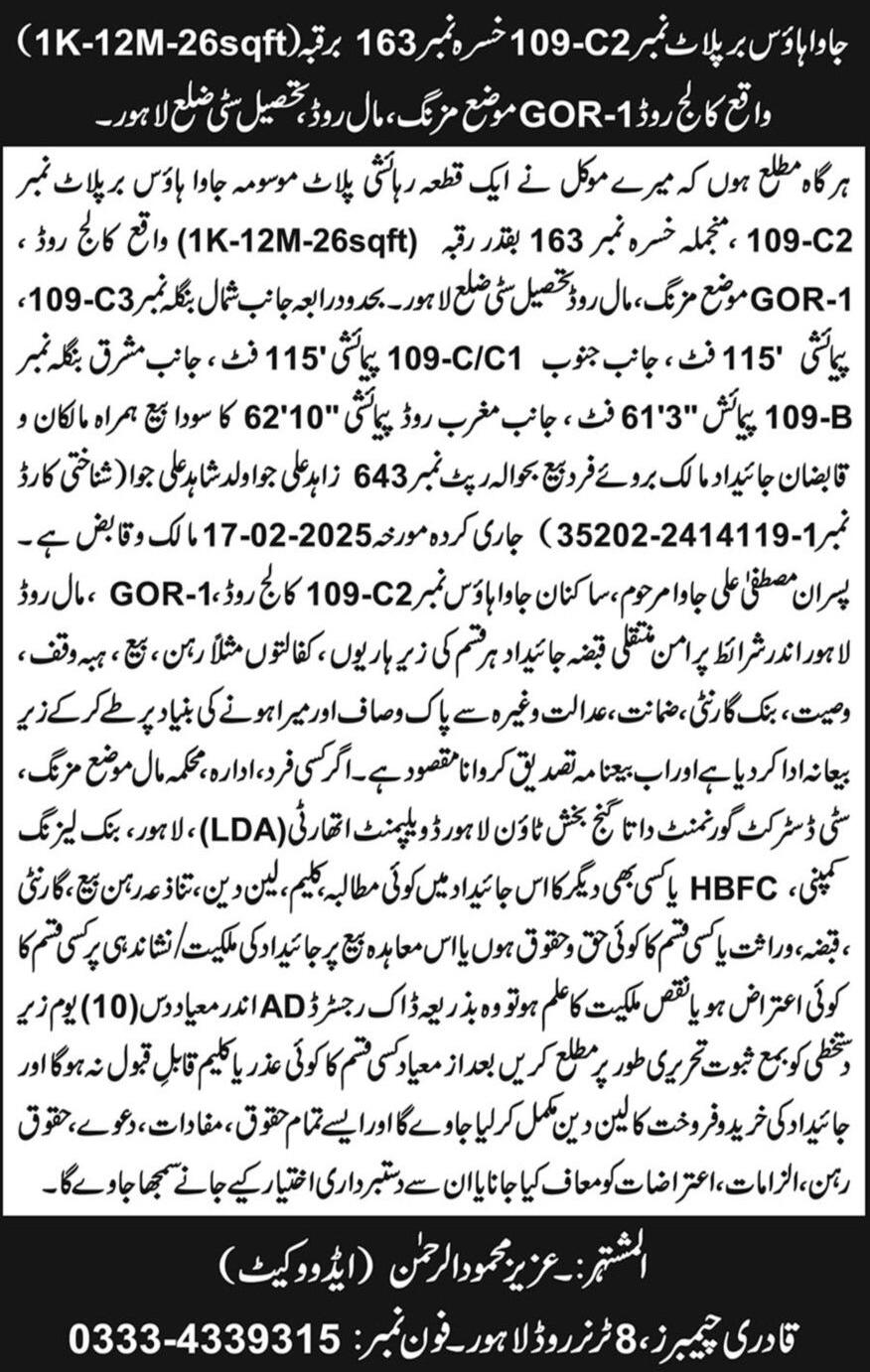
The federal government has authorised the utilisation of development funds amounting to Rs 664 621 billion, out of a total allocation of Rs 1,100 billion, for various ongoing and new social sector development projects under the Public Sector Development Programme (PSDP) during the first nine months (July-March) of the fiscal year 2024-25 According to the latest data released by the Ministry of Planning, Development, and Special Initiatives, Rs 399 372 billion has been spent on development projects during the corresponding period
The data further shows that Rs 169 639 billion out of an allocated amount of Rs 255 854 billion, has been disbursed to corporations including the National Highway Authority (NHA), National Transmission and Dispatch
Company (NTDC), and Pakistan Electric Power Company (PEPCO) For the Aviation Division, funds amounting to Rs 2 206 billion have been disbursed and Rs 405 30 million has been allocated for the Board of Investment Similarly the government authorised Rs 48 640 billion to the Cabinet Division, Rs 2 904 billion to the Ministry of Climate Change, Rs 771 86 million to the Commerce Division and Rs 254 80 million to the Ministry of Communications (other than NHA) Additional funds have been allocated to various ministries and divisions, including Rs 3 231 billion to the Defence Division, Rs 2 076 billion to the Defence Production Division, Rs 322 35 million for the Establishment Division Rs 12 450 billion to the Federal Education and Professional Training Division and Rs 2 129 billion to the Finance Division
Furthermore, Rs 156 598 billion has been allocated to Provinces and Special Areas, Rs 41 669 billion to the Higher Education Commission, and Rs 4 109 billion to the Housing and Works Division
Other key allocations include Rs 62 40 million to the Human Rights Division, Rs 1 494 billion to the Industries and Production Division, Rs 2 205 billion to the Information and Broadcasting Division and Rs 8 375 billion to the
high-level contacts in New York, Cairo, Samoa, and
institutions


by shared history

hindered their entry into high fashion
caricature does a disservice

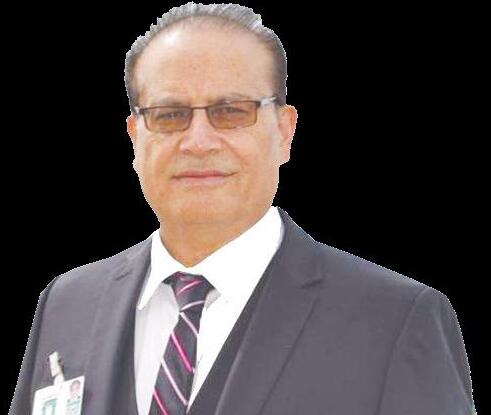
TaHaR Ben Jelloun, the acclaimed Moroccan-French author, has long been a voice against racism and ignorance His seminal book Le Racisme expliqué à ma fille (Racism Explained to My daughter) has just been released in a new graphic novel adaptation, over 25 years after its original publication The timing could not be more apt in an era when being visibly Muslim often means facing suspicion or hostility Ben Jelloun’s message to younger generations about understanding and tolerance resonates deeply He has remarked on the unique difficulty of being a Muslim today–caught between the criminal acts of extremists and the prejudices of a fearful public as Ben Jelloun laments, islam is too often “manipulated by ignorant sinister people” whose fanaticism “poses a danger to the entire world” – and who kill many more Muslims than anyone else
To gauge the world s pulse on islam and Muslims, one need only scroll through social media in the wake of terrorist attacks, islamophobic rhetoric often spikes dramatically after the 2016 Nice truck attack in France for example anti-Muslim tweets surged to nearly 22 000 in a single day Researchers found an average of about 5 000 derogatory tweets about islam per day in the months after, much of it from Europe The sentiments behind these numbers are often raw Some netizens bluntly declare “islam has no place in our country echoing a fear that Muslim immigrants cannot integrate in France s heated burkini debate over islamic swimwear, one French politician even described modest beach attire as an islamist provocation” Such statements imply that no matter how peacefully Muslims live, they are viewed with suspicion as French legal scholar Rim-Sarah alouane observed during that controversy policies targeting Muslim dress send
a painful message to French citizens of that faith: no matter what you do we don t want you here Yet social media has also given a platform to those defending Muslims and pushing back against bigotry When the xenophobic hashtag #Stopislam trended after terror attacks in 2016 it was rapidly flooded by counter-messages from Muslims and allies condemning its premise Many users spoke up to remind the world that “terrorists don’t represent us ” French Muslim voices have been especially active online “intolerance must not change sides ” tweeted French senator Samia Ghali herself Muslim urging France not to betray its values by mistreating an entire community alongside her, countless everyday people – Muslim and non-Muslim – use Facebook, X (Twitter), and other platforms to insist that one cannot blame an entire faith for the crimes of individuals a scroll through global feeds reveals supportive comments like My Muslim friends are some of the kindest people – don t paint them all with the same brush, juxtaposed with vitriolic slurs This stark divide in online commentary shows how contested the public image of islam is today amid the noise a crucial nuance is often lost: the difference between islam as a faith and the cultural practices of some Muslim-majority societies Critics frequently point to images of women in full burqas or other rigid customs and claim they represent islam s essence in reality, many such practices are rooted in pre-islamic or local traditions veiling of women for instance long predates islam– it was present in ancient Byzantine Persian and arabian cultures The Quran calls for modesty but does not mandate the burqa or niqab; most islamic scholars throughout history do not consider covering the face a religious requirement in fact, the ubiquity of face veils in some regions owes more to cultural norms or recent political movements than to scripture as one historical review notes scarves and veils of different colors and shapes were customary in countless cultures long before islam Understanding this distinction is key Oppressive edicts like forbidding girls’ education or forcing women behind veils often stem from patriarchy or local culture not the core tenets of islam By disentangling faith from custom we see that what s often attributed to islam – such as the extreme imposition of the burqa by the Taliban– actually reflects a society’s socio-political climate more than the religion itself islam as practiced by hundreds of millions of ordinary believers is diverse and flexible ranging from women in Jakarta wearing colorful headscarves to businesswomen in dubai pairing designer suits with hijabs Reducing this rich tapestry to a single
There is a persistent narrative in some media that Muslims exist only as victims– discriminated against, voiceless, needing saving While anti-Muslim prejudice is very real it is only half the story Muslims worldwide are increasingly taking agency asserting their rights and identity within secular societies rather than passively accepting marginalization in November 2019, thousands of people–Muslim families, women in hijabs, men in prayer caps, and non-Muslim supporters –marched in Paris to protest islamophobia They carried placards with messages like #SignalerLeRacisme Tolérance Zéro ( Report racism zero tolerance ) and Nous tou te s ensemble ( all of us together ), emphasizing unity in diversity Banners declared Stop all racism and “islamophobia is not an opinion but a crime” , as the crowd demanded equal treatment under the motto of the French Republic: liberty equality fraternity We want to be heard not pushed to the edge of society one veiled Frenchwoman at the rally told reporters Such public demonstrations– organized by Muslim civic groups and joined by supporters from across the spectrum– highlight that Muslims are not merely begging for acceptance; they are actively participating in democratic life They vote they run for office they form organizations to protect civil liberties From the Muslim mayors in Western capitals to youthled initiatives combating hate crimes, Muslims are asserting that they are integral citizens of their countries The narrative of helpless victimhood is giving way to one of empowerment Yes discrimination and hate crimes persist– over 40 percent of French Muslims say they have felt religious bias– but the response is not silence or resignation it is organization, protest, dialogue, and legal action Muslim communities are increasingly standing up to say: we are here we contribute and we will not be demonized for who we are
The world of Muslim fashion
in a world where fashion has become the stage for bold experimentation, the lines between tradition and futurism are increasingly blurred The Muslim silhouette once marginalized in Western fashion shows has now emerged as an icon of transformation and creativity
Today Muslims across the globe especially those in fast-developing societies and diasporic communities in the West, are spearheading a revolution in the fashion world They are no longer silent or sidelined after years of facing islamophobia and passive or active discrimination they are asserting their identities with newfound confidence Bold intuitive creative and forward-looking they are shattering the psychological barriers that once
Are Bangladeshis anti-Indian?
NEaRLY two decades ago i visited an office in dhaka and overheard a brief conversation between a superior and their subordinate The former was telling the latter that they had planned to go to india for Eid shopping but couldn't make it because they were down with flu Honestly up until then i was not aware that there are Bangladeshis who regularly visit the neighbouring country for such purposes
We often hear that Bangladeshis hate india and that this becomes obvious especially during international matches involving the indian cricket team But what about Bangladeshis who travel to india just for shopping and buy products which are available in their own country at equally or more reasonable prices? do they hate india? Given that they earn money in Bangladesh and spend it in another country probably without much thinking can we ask the following question: do they love their motherland for which innumerable people laid down their lives in 1971 and then again in 2024?
Without questioning the patriotism of these india-going and shop-in-india Bangladeshis, we can also ask a set of questions from the opposite direction: are there indians who receive salaries from their country but do their shopping in Bangladesh? do
indians love Bangladesh? Or, are indians anti-Bangladeshi? The above red herring is intended to initiate a discussion on the question if Bangladeshis are anti-indian The prefix "anti" is generally associated with a sense of hostility and antagonism But do Bangladeshis have the power political economic, diplomatic or military to be hostile and antagonistic to their behemoth neighbour which is one of the largest economies with one of the strongest militaries in the world? Similar questions can also be raised in india s relations with the people of its other neighbours are they also anti-indian?
i am wondering about these questions because in media parlance, the concept of anti-indianism is often used to characterise the attitude of Bangladeshis towards india This unjust populist accusation that Bangladeshis are anti-indian has spilled over in academic discourse too i have come across journal articles where academics, who are otherwise welltrained, do not hesitate to caricature and stereotype Bangladeshis as anti-indian i have read essays published by reputable presses where Bangladeshis are routinely associated with phrases such as: anti-indian sentiments anti-indian feelings "not just anti-indianism but anti-Hinduism," "anti-Hindu feelings," "anti-indian forces," "anti-indian posture," "anti-india plank," "anti-india stand " "anti-indian machinations " "anti-Hindu violence " and "anti-indian rhetoric By the way the extension of
the rhetoric of anti-indianism to anti-Hinduism is premised upon the assumption that india is a Hindu country even though constitutionally it is a secular state (with a Hindu majority) in terms of proportional land sharing between Bangladesh and india, no other two countries can perhaps be as close neighbours as Bangladesh and india are Moreover Bangladeshis who were born before the partition of 1947 were indian For example my parents were born (British) indian and died Bangladeshi and were Pakistani in between Likewise, there are millions of Bangladeshis who are still alive and were born when the entire subcontinent was known as (British) india They have lived under three flags and have embraced three nationalities (British) indian Pakistani and Bangladeshi That is to say india is not geographically and spiritually far removed from the people of Bangladesh But what instilled a sense of horror in Bangladeshis that may have given them reasons to dislike the indian establishment and for which anti-indianism is associated with them? in order to understand the recent surge of so-called anti-indian views among Bangladeshis, we need to examine the misrule that shipwrecked their country for over a decade on successive indian governments' watch For fifteen and a half years from early 2009 to august 5 2024 Bangladeshis were crumbling under the juggernaut of Sheikh Hasina s fearsome and self-serving regime Under Hasina's mafia-style fascist rule, they lost their right to life and death with dignity Occurrences of extrajudicial killings and enforced disappearances became the main instrument of the Hasina ad-
We are witnessing the rise of a new aesthetic one that preserves the modesty prescribed by islam while embracing innovation luxury and diversity Whether in the streets of Paris or the malls of dubai Muslim fashionistas are no longer apologetic about their religious values or sartorial traditions instead, they are redefining them, merging tradition with trend and faith with flair
This cultural shift in fashion is not merely symbolic it has substantial economic implications as well according to New York-based firm dinarStandard, global Muslim spending on islamic fashion reached €300 billion in 2022 and is projected to grow significantly, hitting €402 billion by 2027 This growth trajectory representing an annual increase of 6 1 percent highlights that the islamic fashion market is not just a fleeting trend but a sustainable and thriving segment that is reshaping the global fashion economy The 2023–2024 State of the Global islamic Economy (SGiE) report underscores this seismic shift The modest fashion industry distinct from other sectors of the islamic economy is evaluated across four critical dimensions: financial performance public awareness social impact, and innovation Significantly, governance plays a less central role in this sector, providing brands and designers with greater freedom and flexibility thereby fueling creativity and rapid market evolution Several countries have emerged as critical players within this transformative landscape Turkey, Malaysia, indonesia, Singapore, and italy have been particularly influential in shaping the modest fashion industry The strongest demand has consistently come from markets such as iran Turkey Saudi arabia Pakistan and Egypt These nations not only represent significant consumer bases but are also increasingly influential in shaping global fashion trends investment activity further validates the vibrancy and potential of this sector Between 2022 and 2023, islamic fashion attracted approximately €121 6 million in trade-related investments The UaE Turkey and indonesia are leading the investment charge acting both as substantial consumer markets and as proactive developers and exporters of islamic fashion innovations such as modest surfwear, garments designed to optimize vitamin d absorption, and practical water and windproof hijabs reflect the sector's dynamism Furthermore trends like social commerce clothing resale and rentals to promote sustainability alongside rising demand for specialized modest sportswear for women, represent exciting growth opportunities highlighted by the SGiE Report Meanwhile, ten OiC members have emerged as top importers of islamic fashion: the UaE Saudi arabia Turkey Malaysia Kazakhstan iraq indonesia Qatar Kyrgyzstan and Kuwait This proves that demand is not limited to Western Muslims or diaspora populations
ministration to rule Bangladesh and to keep its population under subjugation Family members of many victims didn't even have the opportunity to observe funeral rites for the dead Nor were they able to properly mourn their loved ones or accord them a dignified burial There were many instances where government forces killed citizens and concealed the dead bodies, and bereaved family members were given an opportunity to receive the remains of the deceased only after agreeing to say in public that their loved ones died of heart attacks strokes or other health complications detailed information about the existence of a network of secret torture centres, called aynaghar or the House of Mirrors (ghost houses) that government forces set up across Bangladesh under Hasina s leadership is now emerging We are gradually grasping the fuller extent of post-mortem drowning or dead body dumping cases orchestrated by the regime On the economic side, financial institutions including Bangladesh's central bank were plundered and ruling party high-ups and their cronies siphoned off money to purchase expensive properties in foreign destinations and/or to deposit into their offshore bank accounts People were forced to pay high prices for food items and other necessities in order to satisfy the greed of those in power in the name of megaprojects ministers and their subordinates and henchmen fattened their pockets it is common knowledge in Bangladesh and beyond that the Hasina regime remained in power undemocratically for such a long time almost solely through india s covert and overt support as in his 2024 book Pathways of autocratisation ali Riaz argues that Bangladesh s autocratisation process under Hasina was influenced by the overall global political situation, but accentuated, perhaps succeeded, because of its neighbour
india's unqualified support for" her since 2009 (pg 62) Unfortunately india's patronisation of autocracy in Bangladesh is often given an innocuous label a strategy to maintain a stable regional political system even if to the detriment of Bangladesh after a months-long intense struggle known as the July revolution and at the expense of thousands of lives and limbs, on august 5 2024 Bangladeshis collectively removed Hasina s oppressive regime (she fell and fled to the country whose interests she seemingly espoused) Now a constant barrage of allegations has been mounted against Bangladeshis that they are anti-indian in other words, the liberation of Bangladeshis from oppression is being perceived as going against india s interests BUT WHY? during Hasina s fifteen-and-a-half-year rule, she did everything to accommodate indian demands, regardless of what was in Bangladesh's national interests Trade deficits in favour of india increased, Bangladesh gave india transit benefits and access to rivers and ports free of cost while buying electricity from it at an outrageously high price For these and many other reasons, Bangladesh became a greater source of remittances for india What is more, for decades indian forces have been killing Bangladeshis at the borders on a regular basis while the relations between the two countries were being described as golden during Hasina s rule Considering these and other examples, Bangladesh was having a relationship with india that was heavily slanted in favour of the latter Bangladeshis simply wanted this "lopsided" relationship to end does this make them anti-indian?
Dr Md Mahmudul Hasan is professor in the Department of English Language and Literature at the International Islamic University Malaysia
QaMar Bashir

ISRAEL STILL EYEING A LIMITED ATTACK ON IRAN’S NUCLEAR FACILITIES
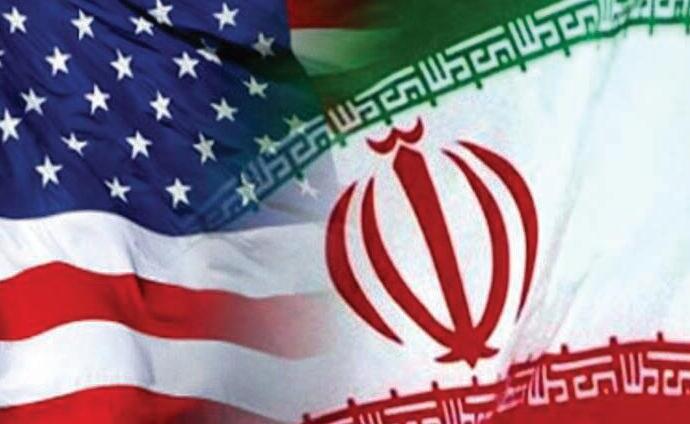
tory evidence Footage showed ambu-
GAZA A G E N C I E S
Autopsies carried out on 14 of the 15 Palestinian rescue workers killed by Israeli forces in southern Gaza last month have revealed gunshot wounds to the head and torso as well as blast injuries caused by explosive munitions a forensic pathologist in Gaza said on Wednesday Ahmed Dhair, who led the postmortems, said the victims included personnel from the Palestinian Red Crescent civil defence and United Nations agencies His findings included evidence of explosive bullets with fragments found in several bodies In one case, the bullet head had exploded in the chest, he told The Guardian The Israel Defense Forces (IDF) has acknowledged carrying out the strike but has changed its account amid contradic-
PAKISTAN’S
ROLE IN ENHANCING MARITIME SECURIT Y: A SPOTLIGHT ON INDIAN OCEAN NAVAL SYMPOSIUM (IONS)
member states and observers to collaborate on maritime security challenges unique to the Indian Ocean
which have long played pivotal roles in addressing these issues Each of these forums offers a platform for member states to collaborate share information and strengthen collective efforts to safeguard maritime interests In this context, the Indian Ocean Naval Symposium (IONS) stands out as a vital regional forum aimed at enhancing maritime security and collaboration among the countries bordering the Indian Ocean Founded in 2008 IONS provides a platform for member and observer states to engage in dialogue share best practices and work toward collective solutions to maritime challenges With the Indian Ocean serving as a critical waterway for global trade, energy resources, and military operations, IONS plays a crucial role in ensuring the security and stability of this strategic region Pakistan officially became a member of the Indian Ocean Naval Symposium (IONS) during the Conclave of Chiefs (CoC) held in March 2014 in Australia Since then Pakistan has been an active participant in IONS activities including biennial meetings, preparatory workshops, and joint naval exercises
IONS focus is specifically on the Indian Ocean region which is home to over 35 countries spanning South Asia the Middle East East Africa and Southeast Asia & it brings together naval forces maritime agencies and stakeholders to address issues like piracy maritime terrorism, illegal fishing, and environmental concerns However, what sets IONS apart is its emphasis on regional cooperation and its inclusive approach that allows
The structure of IONS is designed exclusively to encourage dialogue, share information, and collaboratively address shared maritime challenges It operates through various platforms including the IONS Preparatory Workshop (IPW) the Conclave of Chiefs (CoC) and IONS Working Groups (IWGs) each serving a specific purpose in the larger framework of regional maritime cooperation The IONS Preparatory Workshop (IPW) is a key component of the IONS process It is held biennially and is hosted by a member state in between the Conclave of Chiefs (CoC) meetings The IPW serves several important functions The primary goal of the IPW is to lay the groundwork for the upcoming Conclave of Chiefs (CoC) which is the main decision-making event of IONS
During the IPW, member states discuss the theme for the next IONS seminar, draft agendas, and review the outcomes of previous IONS activities The workshop also provides a platform for reviewing resolutions passed by IONS Working Groups (IWGs) One of the biggest advantages of IPW is to provide an opportunity for all member states to engage in a constructive dialogue, discuss pressing maritime issues, and work toward building consensus on security measures and collaborative initiatives The decisions made during the IPW are often recommendations for discussion and further approval at the CoC Pakistan Navy is scheduled to host IONS Preparatory Workshop (IPW-25) in Karachi from 21st to 22nd April 2025
Pakistan s strategic location at the crossroads of South Asia, the Middle East, and Central Asia places it in a key position to benefit from and contribute to the IONS framework As a member, Pakistan is directly involved in shaping regional maritime security policy and participating in joint initiatives aimed at improving the security and stability of the Indian Ocean Pakistan has very recently hosted its biennial Exer-
cise AMAN & its defunct part AMAN DIALOGUE in Karachi from 7th to 11th February 2024 which brought together over sixty regional navies for joint drills aimed at improving interoperability and addressing shared maritime security challenges Such a large participation is a clear testimony of Pakistan efforts and resolve as a major maritime nation and its working with international forums like Combined Maritime Forces & IONS Engagement of Pakistan with International and Regional maritime players can be gauged from the fact that the memory of the latest maritime events of EXERCISE AMAN has not yet fade away that Pakistan Navy is now hosting IONS Preparatory Workshop (IPW-25) in April 2025 at Karachi
At the IPW-25 discussions are expected to focus on both traditional and non-traditional maritime threats that pose significant challenges to regional security in the Indian Ocean Traditional maritime threats include naval confrontations, and territorial related disputes over strategic sea lanes, which directly impact the freedom of navigation and the security of vital trade routes Non-traditional maritime threats on the other hand encompass a wide range of emerging risks such as piracy maritime terrorism illegal fishing human trafficking environmental degradation, and the growing threat of cyber-attacks targeting maritime infrastructure
The workshop at Karachi will provide a platform for member states to collaboratively address these evolving threats sharing best practices strengthening maritime law enforcement and improving regional cooperation to enhance security across the Indian Ocean
By hosting and participating in joint exercises Pakistan Navy is demonstrating its continued commitment to enhancing regional maritime security Pakistan s contribution to IONS highlights the importance it accord as a responsible maritime nation in the comity of nations to international and regional cooperation in safeguarding vital sea lanes and addressing emerging maritime threats
President
s just-concluded Southeast Asia tour focused on good-neighborly relations, promoted mutually beneficial cooperation and achieved complete success Chinese Foreign Minister Wang Yi said on Friday Wang also a member of the Political Bureau of the Communist Party of China Central Committee, said during a press briefing that Xi s trip to
On Xi s visit to Vietnam Wang said that the strategic guidance of the top leaders of the two parties and the two countries is the biggest advantage and the most important political guarantee for the development of China-Vietnam relations
The leaders of the two parties and countries unanimously confirmed that in accordance with the overarching goals characterized by six mores the two sides will advance the development of their comprehensive strategic cooperation with higher quality and at deeper levels and accelerate the building of a China-Vietnam community with a shared future that carries strategic significance Wang stated During Xi s visit to Vietnam, bilat-
eral railway cooperation was expanded and upgraded which particularly demonstrated the determination of the two countries to seek common development, Wang added On Xi’s visit to Malaysia, Wang said its most significant outcome was that the leaders of the two countries elevated China-Malaysia relations to a new height and announced the building of a highlevel strategic China-Malaysia community with a shared future This marks another leap in the positioning of the bilateral relationship after China and Malaysia announced the joint building of a China-Malaysia community with a shared future in 2023, Wang noted
A highlight of this visit is that the two sides agreed to become a pacesetter for regional cooperation on new quality productive forces, focusing on cuttingedge fields such as the digital economy, green economy and artificial intelligence he added
Speaking of Xi s visit to Cambodia Wang noted that the highlight was the joint announcement by Xi and Cambodian Prime Minister Hun Manet on elevating the China-Cambodia relationship to an all-weather China-Cambodia community with a shared future in the new era marking the first time that China has elevated its bilateral relationship with a Southeast Asian country to an allweather level X i ’s S outheast A sia tour promotes good-neighborliness, mutually beneficial cooperation, says Wang Y i
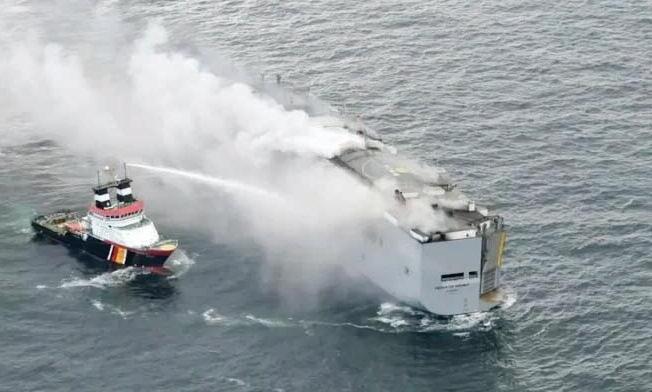

CORPORATE CORNER
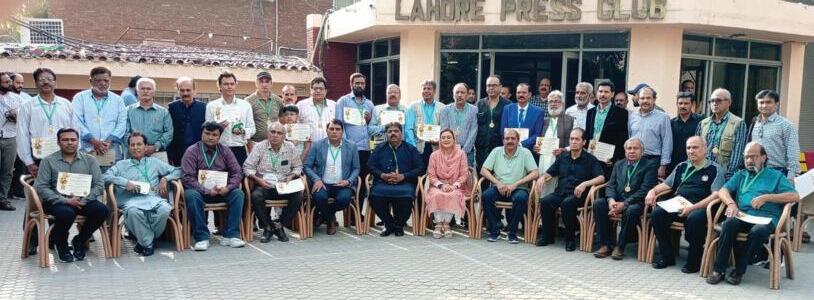
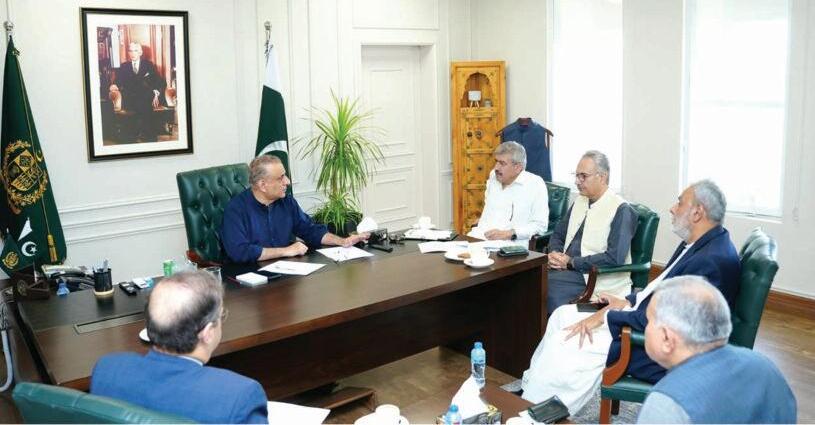
IMC Promotes DEI at Pakistan’s First-Ever Reverse Career Expo
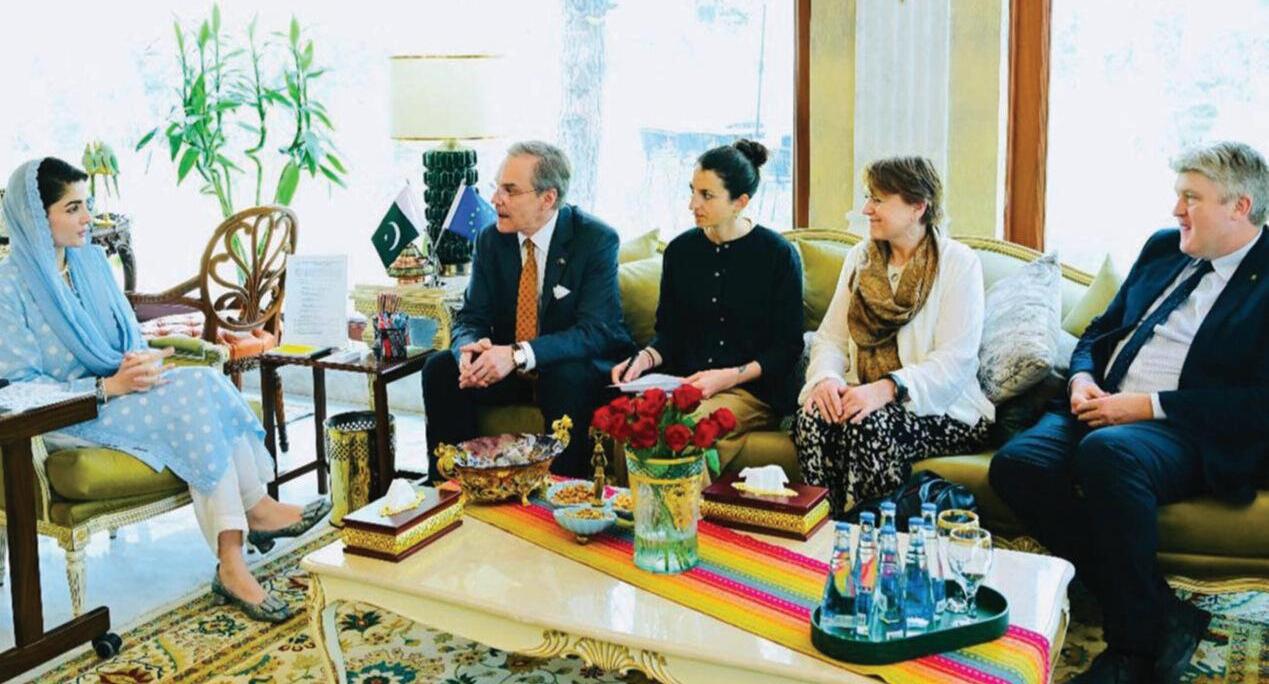
Power ful commitments to
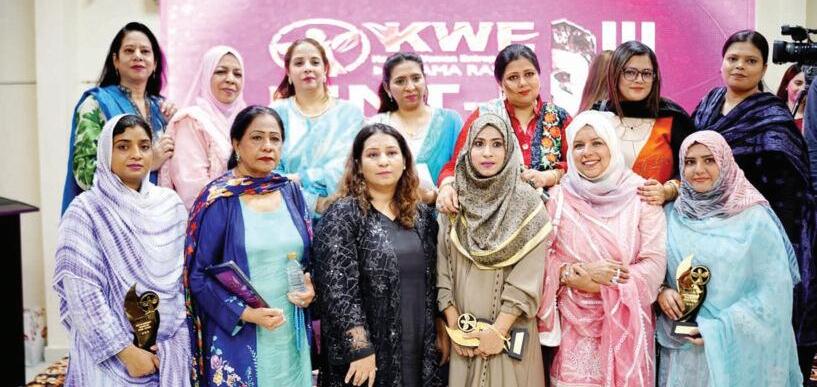
forefront Instead
candidates
CBD Punjab to install solar panels on Walton railway crossing flyover to power sustainable future
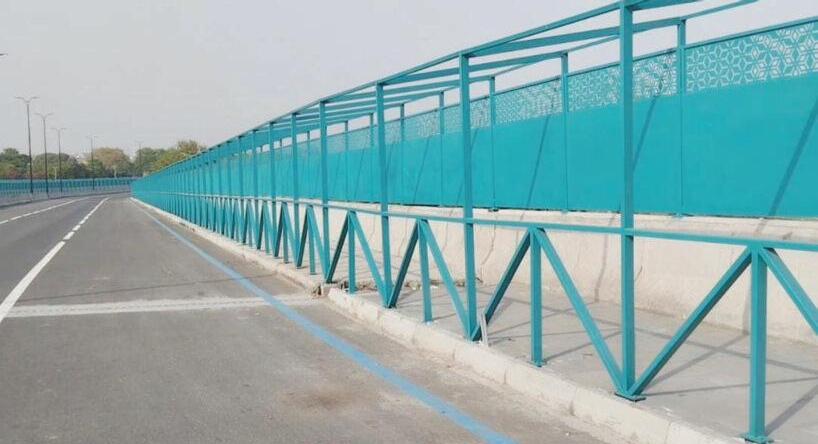
(PwDs) at
engaging
in
with
booths HR representatives from
450 companies participated in the event marking a significant milestone in inclusive hiring Ali Asghar Jamali, CEO, Indus Motor Company mentioned that At Toyota, we believe that mobility is about more than just moving people from one place to another It’s about empowering individuals to move forward in life towards opportunity dignity and independence This belief lies at the heart of our global commitment: Mobility for All The initiative reflects IMC s dedication to Diversity, Equity & Inclusion (DEI) agenda in Pakistan and reinforces its ongoing call for organizations to build workplaces where everyone continues to belong and thrive Celebrating 35 years of Toyota in Pakistan IMC sees this partnership as a meaningful way to give back by championing opportunity and innovation in equal measure
PDA delegation meets Federal Minister to highlight impact of 18% GST on packaged milk ISLAMABAD
A high-level delegation of the Pakistan Dairy Association (PDA) met with the Federal Minister for Planning Development & Special Initiatives Professor Ahsan Iqbal to discuss the current challenges specifically after the imposition of 18% sales tax on packaged milk facing the dairy industry and the need for sustainable reforms to unlock its full potential The delegation included Kashan Hasan, Managing Director FrieslandCampina Engro Pakistan and Vice Chairman of PDA; Dr Shehzad Amin CEO PDA; Dr Muhammad Nasir from FCEPL; Aatekah Mir from Nestlé Pakistan and Noor Aftab from Tetra Pak During the meeting, the PDA presented it s position on the impact of the unprecedented 18% sales tax on packaged milk, and its ripple effects on farmers consumers and the formal dairy value chain The PDA emphasized that this tax has not only made safe and nutritious packaged milk unaffordable for millions of households but also triggered a decline in milk procurement from farmers by nearly 20%, leading to widespread disruptions across the sector With over 40,000 farmers displaced and 500+ milk collection centers shut down the Association reiterated that the current tax policy undermines formalization weakens investment in safety and quality and erodes public trust in the sector
SYED AFSAR SAJID
Board of the University of Karachi has awarded 16 PhD and 49 MPhil two M S Course Work (30 Cr Hr ) degrees in various disciplines during the recently held ASRB meeting The KU Vice Chancellor Professor Dr Khalid Mahmood Iraqi chaired the meeting which awarded PhD degree to Rukhshinda Begum (Business Administration-KUBS) Jasra Gul (Chemistry [HEJ]) Farheen Qazi (Computer Science) Syed Rashid Ali (Economics) Imtiaz Ahmed, and Syeda Hadiqa Noor (Marine Biology), Saima Mohsin (Molecular Medicine [PCMD]), Rabia Munawar, and Sonia Khan (Pharmacology), Sumbul Zehra (Physics) Muhammad Bilal Zafar (Political Science) Abdul Ghaffar (Public Administration) Habib Ahmed (Teacher Education) Saira (Urdu) Syed Faisal Hashmi (Women s Studies) and Samina (Zoology) Furthermore the MPhil degree was awarded to Waqar Hussain, Fareesa Maryam, Anila Kiran, and Chetal Shaheen (Applied Economics [AERC]), Fatima Javeed, and Sana Shaikh (Chemistry) Syeda Kissa Zehra Naqvi (Chemistry [HEJ]) Noor ul Huda Shabbir Ali Rashid and Rafique Ahmed (Clinical Psychology) Mahgul Malik (Economics) Zeenat (Food Science and Technology), Shah Nawaz (History),
Biographic literature comprises autobiographies and biographies that narrate life stories of men of eminence their happy and unhappy experiences, achievements and losses longings and frustrations and fears and fantasies etc intended to inform amuse and instruct the reader empathetically Poet Henry Longfellow s lines aptly endorse the notion: Lives of great men all remind us we can make our lives sublime, and departing, leave behind us, footprints on the sands of time Famed biographer Lytton Strachey introduced ‘a new kind of biography
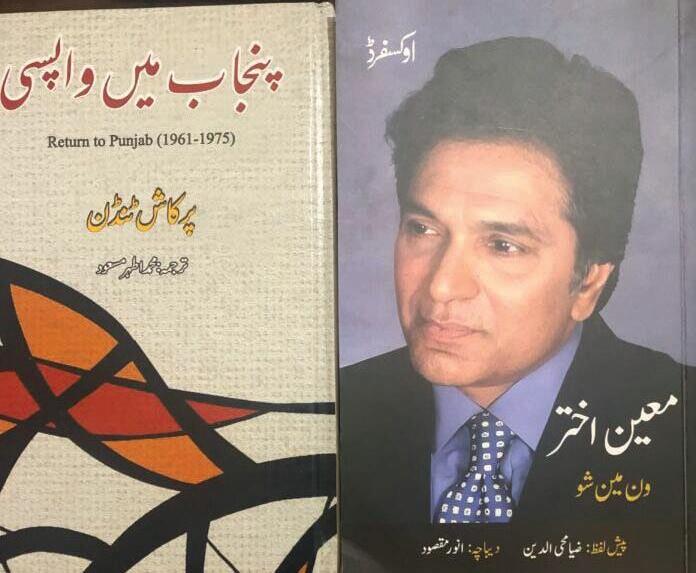

RANA SANAULL AH ASSURES SINDH’S WATER RIGHTS AMID CANAL PROJECT DISPUTE
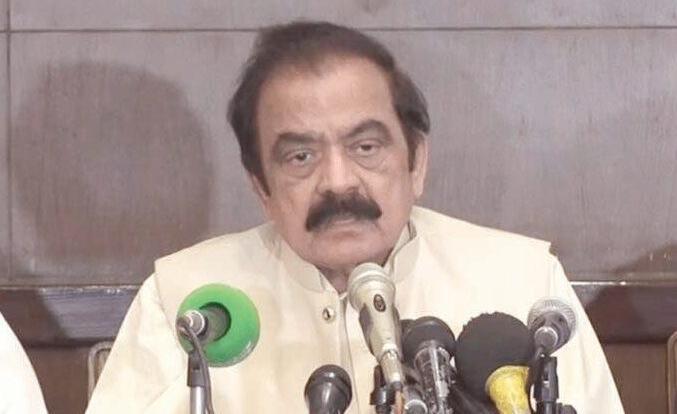
RAWALPINDI S TA F F R E P O R T
A district court on Saturday sent Pakistan Tehreek-e-Insaf (PTI)
senior leader Aliya Hamza and four party workers on judicial remand who were arrested for holding a youth convention without taking permission from authorities
A tense situation erupted in Rawalpindi around midnight after police arrested PTI Chief Organiser for Punjab Aliya Hamza and several workers and shifted them to multiple police stations in the city
The arrested PTI leader and workers were produced before a district court in Rawalpindi on Saturday
During the hearing the court ordered the judicial remand of Hamza, Adil Munir, and Noman Aslam, while the two accused, Shamim Aftab and driver Muhammad Zahid were granted bail
Shamim and Zahid have been directed to submit surety bonds worth Rs25 000
Moreover, the court also fixed the hearing of Hamza s bail plea on April 22 and sought a report from the investigation officer on May 3
With police sources citing a PTI convention sans necessary permission from authorities as the rationale behind the arrests, Hamza, along with eight other workers, was shifted to the Civil Lines Police Station
The PTI workers’ arrest led to a tense situation after a large number of PTI supporters gathered out-
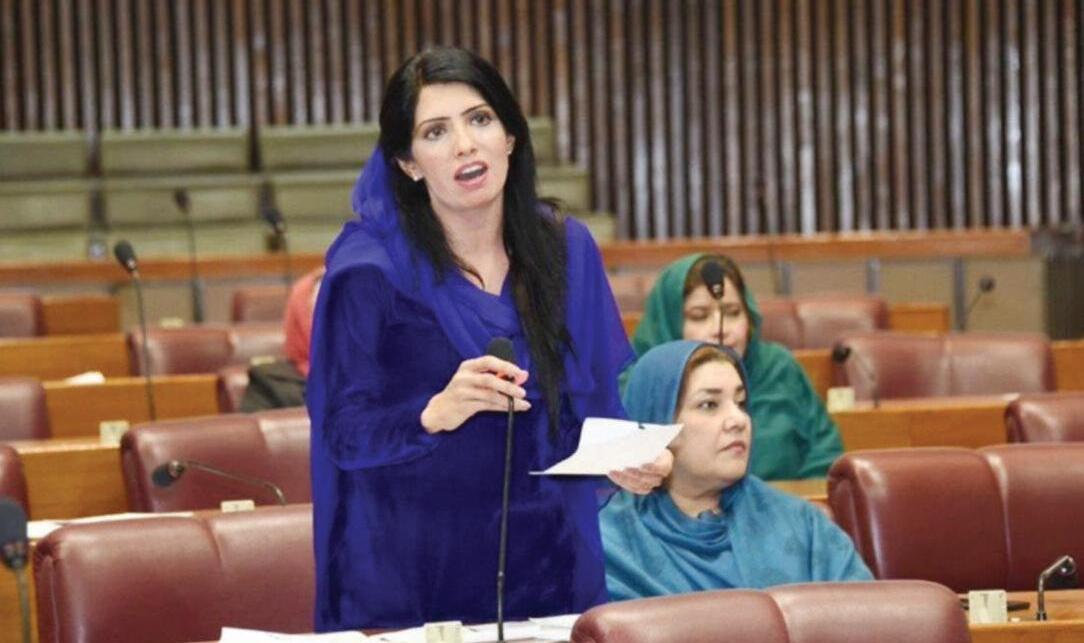
side the Civil Lines Police Station to protest against the police action
A case has been registered against Hamza and other PTI workers at the Airport Police Station with provisions relating to incitement resisting the police blocking the road and interfering with official duties
The case, while alleging that the suspects were protesting in Dhok Kamal Din by blocking the road and resorting to stone pelting against the police as well says that Hamza Zahid Noman Adil and Shamim have been arrested by the police
The development marks the latest incident in the over-a-yearlong PTI tug-of-war with the authorities regarding the former ruling party’s bid to hold public gatherings with the government launching a crackdown against them citing inter alia security and permission-related reasons
The Imran Khan-founded
party has time and again blamed police and government action against them for depriving the party of political space On Thursday, Khan’s sisters Aleema Khan Noreen Khanum and Uzma Khanum along with National Assembly Opposition Leader Omar Ayub Khan Sunni Ittehad Council (SIC) chief Sahibzada Hamid Raza, and Punjab Opposition Leader Ahmed Khan Bhachar were detained by the police at a checkpost near the Adiala jail
The arrests came after the PTI leaders engaged in a verbal altercation with police for not being allowed to meet the PTI founder, incarcerated in the Adiala jail
The altercation occurred over a week after PTI workers clashed with law enforcers near Rawalpindi s Adiala jail with police detaining multiple workers and leaders
5.9 magnitude earthquake jolts Lahore, Islamabad and other parts of country
ISLAMABAD/LAHORE
S TA F F R E P O R T A powerful earthquake measuring 5 9 on Richter Scale jolted Islamabad Lahore and several cities in Khyber Pakhtunkhwa (KP), causing widespread fear The tremors, the third in a week were recorded at 11:47am forcing residents to rush out of their homes and workplaces in fear reciting Kalma Tayyaba and verses from the holy Quran
According to the National Seismic Monitoring Centre, epicenter of the earthquake was located near the Afghanistan-Tajikistan border region with a depth of 94 kilometres at latitude 36 21 N and longitude 71 34 E
Tremors were felt in several parts of the country, including Lahore, Islamabad and Rawalpindi, Murree Peshawar Lower Dir Bajaur and Malakand Several parts of Punjab including Okara Mandi Bahauddin Hafizabad Toba Tek Singh and Chiniot also were shaken People in the affected areas
moved out of their houses and workplaces in panic Authorities have reported that the depth of earthquake was 94 kilometres and the epicentre was AfghanistanTajikstan border Tremors were also felt in Afghanistan s Jalalabad city
Several incidents of tremors in parts of Pakistan have been reported in the last 10 days
On April 16 an earthquake measuring 5 3 on the scale struck federal capital Islamabad and several cities in Punjab, Khyber Pakhtunkhwa and Kashmir in the wee hours
Tremors were felt in Islamabad Rawalpindi Lahore Faisalabad Gujrat Gujranwala Sheikhupura Zafarwal Sarai Alamgir, Peshawar, Nowshera, Mardan, Abbottabad, Haripur, Swat, Chitral, Shangla, Malakand, Muzaffarbad, Bhimber, and several other cities
No loss of life and property was reported from any part of the country
According to the National Seismic Monitoring Centre, Islamabad, the epicentre of the earth-
quake was located in the Hindukush Mountain range in Afghanistan at the depth of 121 kilometres
Earlier on April 12 a 5 5 magnitude earthquake hit Islamabad and several parts of Punjab and Khyber Pakhtunkhwa In Punjab, tremors were felt in Lahore Rawalpindi Mianwali Sangla Hill Chakwal Hafizabad Shiekhupura Gujrat Gujranwala and other cities The earthquake jolted Swabi, Haripur, Abbottabad, Swat, Malakand, Mardan, Lakki Marwat and other cities of KP
The epicentre of the earthquake was located 60km northwest of Rawalpindi while it occured at a depth of 12 kilometres On March 31 last, a 4 7 magnitude earthquake struck parts of Karachi
The Meteorological Department said in a statement that tremors were felt in some areas of Karachi
According to the Seismological Centre the earthquake measured 4 7 on the scale the depth of the earthquake was 19 kilometres, and the epicentre was 75 kilometres north of Karachi
the Supreme People’s Court of China This MoU aims to significantly enhance bilateral judicial cooperation by establishing institutional linkages, facilitating capacity-building initiatives, and promoting knowledge exchange in critical areas, including international commercial law, arbitration, cybercrime, financial crime, climate change litigation and judicial technology integration Moreover the MoU seeks to deepen collaboration in dispute resolution recognition and enforcement of judicial decisions and mutual legal assistance in civil matters, reaffirming the shared commitment of both nations towards judicial independence, sovereignty, and adherence to the rule of law Mr Justice Shahid Waheed will deliver a keynote speech titled “Judicial Application of Artificial Intelligence ” highlighting AI s transformative potential to enhance judicial efficiency transparency and accessibility Justice Waheed will discuss Pakistan s ongoing initiatives, including AI-driven legal drafting in collaboration with global institutions such as ETH Zurich, advanced AI-based legal research tools, digitization of court records and predictive analytics for ensuring consistent judicial outcomes He will underscore the ethical framework necessary for AI integration focusing on transparency human oversight, bias mitigation, data protection, judicial training, accountability and establishing an AI Ethics Committee within Supreme Court of Pakistan to oversee the responsible and transparent application of AI technologies Additionally on the sidelines of the SCO Conference Chief Justice Yahya Afridi will hold bilateral discussions with the Chief Justice of Iran exploring ways to deepen judicial exchanges and collaborative engagements This interaction underscores Pakistan’s dedication to strengthening international judicial cooperation
